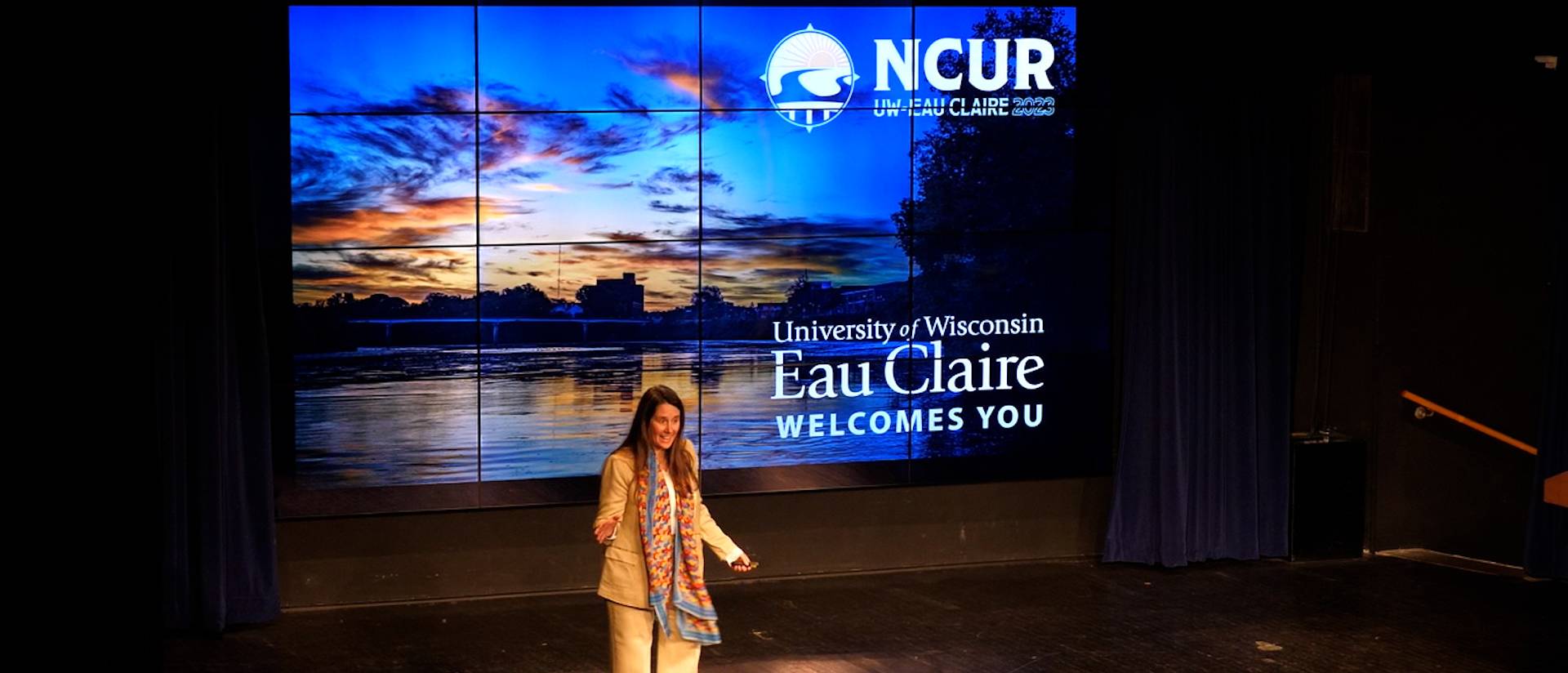
Lisa Schulte Moore, who graduated from UW-Eau Claire in 1993 with a degree in biology, is the associate director of the Bioeconomy Institute and professor of natural resource ecology and management at Iowa State University.
Like many aspiring scientists, Dr. Lisa Schulte Moore came to the University of Wisconsin-Eau Claire curious about the natural world but not quite sure how she might help solve its many problems.
She found her answer in a plant ecology class taught by Dr. William Barnes, a UW-Eau Claire professor of biology from 1972-1999.
“He blew my mind,” Schulte Moore says of Barnes, who later became her undergraduate research mentor. “I had no idea prior to that time that ecology was a field of study. I had no idea about people studying the relationships between life and the environment. And I really had no idea that somebody could make a career out of this kind of study.”
Three decades later, Schulte Moore — a first-generation college student — is a world-renowned scientist who is working to find ways to feed the world’s eight billion people without destroying the planet.
Schulte Moore, who graduated from UW-Eau Claire in 1993 with a degree in biology, is the associate director of the Bioeconomy Institute and professor of natural resource ecology and management at Iowa State University.
A recipient of the prestigious 2021 MacArthur Fellowship, often referred to as the “genius grant,” the UW-Eau Claire alumna told students attending the 2023 National Conference on Undergraduate Research that she can trace her successful career back to her experiences as a Blugold.
“As I reflect back on my pathway, my undergraduate research career gave me the skills and set me on a very productive path that I have been on since that very day,” Schulte Moore said.
While we have a “long way to go” on the issue of preserving the Earth, “we’re getting better every day, more efficient in our agricultural production, better in the supply chain systems,” Schulte Moore said during a presentation at NCUR, an international conference that brought more than 3,500 undergraduate research students and their faculty mentors to UW-Eau Claire in April.
During her NCUR presentation, “Unlock Your Genius through Undergraduate Research,” Schulte Moore said the knowledge, skills and networks students build through undergraduate research provide a springboard toward their future successes.
The undergraduate research she did as a Blugold was the beginning of a career that later grew into the collaborative agricultural production and environmental work she engages in today, she says.
Through her agricultural research, Schulte Moore works to make land more productive and more sustainable by bringing together diverse groups of people to help solve major challenges at the intersection of agricultural and the environment.
Agriculture has been a major cause of the decline of biodiversity as land use changes from natural to agricultural systems, Schulte Moore says. Today, agricultural greenhouse gas emissions represent about 10% of U.S. total greenhouse gas emissions.
Schulte Moore and her scientific team have worked with Midwest farmers to strategically integrate prairie strips back into farm fields to reconnect with their native ecosystems. Her research findings indicate that fields with prairie strips had reduced soil loss while the number of birds doubled and pollinators tripled.
“We worked with farmers and helped them take a science concept and actually put it into practical application,” Schulte Moore says. “That was not easy. They taught us as much as we taught them. They also liked it and started telling their neighbors and friends, and they told their neighbors and friends.”
By February 2023, there were about 18,000 acres of prairie strips on 180,000 farm fields in 14 states across the U.S.
“Going from an experiment with literally 20 acres of prairie strips in 2007 to now, 15 years later, when I look at this picture, I literally get goosebumps,” Schulte Moore says. “It is so cool how the science that my teams and I have done have impacted people’s decisions for how they manage their land and how it’s also influenced federal legislation.”
While she’s proud of her accomplishments, Schulte Moore says it took many years and a lot of hard work to get where she is today.
“I didn’t go from working in someone’s lab to leading large transdisciplinary teams on big, hard societal problems in one fell swoop,” Schulte Moore says. “I didn’t go from measuring the impacts of federal policy on our natural resources to helping write policy about the impacts of federal policy on our natural resources in one fell swoop.”
To be successful, she had to put in the time, energy and work at every step in her career, she says.
“Undergraduate research is hard,” Schulte Moore says. “I found the hard doesn’t go away. Master’s research was hard, my Ph.D. research was hard, my postdoctorate was hard. Being a young assistant professor was hard. That meeting I prepared for a couple weeks ago was hard, but in the process I have learned that it is about the process. The process is hard but the process is what’s fun. Being hard is what makes it worth doing.”
During NCUR, Schulte Moore shared five tips she says will help students unlock their genius as researchers:
- Be curious.
- Lean into learning.
- Share what you learn with others.
- Take educated risks.
- Enjoy right now.
Written by Gary Johnson
Link to original story: https://www.uwec.edu/news/news/uw-eau-claire-biology-class-started-alumna-s-journey-to-becoming-world-renowned-scientist-5746/
